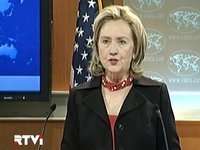|
|
'American Spring' and Putin's inevitable victory
By Lisa Karpova
- December 11, 2011
 The Western media have been paying a lot of attention to the Russian parliamentary elections during the recent days. Some of the publications about the post-election events in Moscow and other Russian cities are attention-catchy indeed.
Britain's The Guardian is known for its anti-Russian publications. Here is what the newspaper's respectable David Hearst wrote in his piece of work from December 6th under the headline "Russia election aftermath is no Tahrir Square moment."
"Despite having much in common with the Arab spring, the Russian protest movement is too diverse and politically passive," Hearst wrote commenting the Monday demonstration in Moscow. "On the face of it, Putin's Russia shares some of the ingredients of Ben Ali's Tunisia or Hosni Mubarak's Egypt: a disenfranchised but educated youth, an oppositional internet and social media, a corrupt state run as a kleptocracy by a small elite, and the impossibilty of real political change. So was the Duma election a tipping point, one of those moments where a repressed political opposition comes out onto the streets and stays there? The short answer is no," the author of the article said. "Judging the true electoral weight of opposition parties that are banned from running for election, such as Boris Nemtsov's the Party of People's Freedom, or Parnas, is a mug's game. First, liberal parties are notoriously prone to splits; and second, they are just not that popular. The best of them, Yabloko got just 3.3%. Right Cause, the party that emerged from the ashes of the Union of Right Forces (SPS), finished last in the Duma race with just 0.6%. These parties are not a Muslim Brotherhood-in-waiting," David Hearst wrote.
Afterwards, the journalist refers to Vladimir Ryzhkov, who said that "85% of Russians are not involved in any association of any kind, political, social, religious or any other. There is near-complete passivity...it could be a while before Putin faces a political opponent he has to take seriously," he concludes.
To put it in a nutshell, Mr. Hearst tried to say that Arab Spring was impossible in Russia no matter the efforts taken. It would not be an exaggeration to say that Mr. Hearst is not alone here. The vast majority of Western politicians are aware of that too.
Nevertheless, European and American politicians have launched the public campaign in which they interfere in Russia's internal affairs. They conduct this campaign as if they have decided everything already. It seems that a word from Brussels or Washington will be enough to make the regime fall.
US Secretary of State Hillary Clinton did not want to burden herself with facts. She announced the Russian regime illegal and demanded legitimacy in Russia be retrieved - i.e. the Russian administration must change. Ms. Clinton released those statements in the form of an ultimatum, similarly to what she was saying about Gaddafi's regime. Needless to say that the US-sponsored European observers say the same, precariously.
Thus, the color revolution, which is impossible in Russia, has received the desperate support from the United States. Has Clinton lost her mind? Maybe she has. She can do it taking into consideration the current position of the Democratic Party in the States. Win or lose, so to speak.
Russia's Foreign Minister Sergei Lavrov found a politically correct explanation to Washington's views on the Russian elections.
"Clinton's remarks in Vilnius about the elections in Russia demonstrated disrespect towards the OSCE. I would not like to comment that. In my opinion, it is absolutely obvious. This is not the reason why we are going to the organization which is called the Organization for Security and Cooperation in Europe. This organization is not a place for meetings. This is neither Hyde Park in London, nor Triumph Square in Moscow. This is not some other place where organizers can come to pour out their souls and then go. We have claims to each other, and we have many claims to our partners too. If we want adequate questions to be solved, it should be done directly in the form of a dialogue, rather than by gaining political scores," Lavrov said.
Mr. Lavrov was speaking about the political scores for the election campaign in the United States. Russia does not need to understand the reason which made US and European politicians "lose their minds" and burn bridges. They publicly say that they want to interfere in Russia's affairs to establish the regime of their liking in the country.
Let's pay attention to primary political consequences of this "insanity" for Russia. The demonstrative attempts of foreign politicians to change the regime in Russia will only unite the Russians in front of the external enemy. The people will consolidate themselves around the leaders, for whom it is vital to protect Russia from feeble efforts from the outside.
The harder US Democrats try to outstrip the Republicans in their efforts for "promoting democracy" in Russia, the bigger chances Putin has for victory at the presidential election.
|
|
|
|
|
|  |
|
 The Western media have been paying a lot of attention to the Russian parliamentary elections during the recent days. Some of the publications about the post-election events in Moscow and other Russian cities are attention-catchy indeed.
The Western media have been paying a lot of attention to the Russian parliamentary elections during the recent days. Some of the publications about the post-election events in Moscow and other Russian cities are attention-catchy indeed.
 We recommend
We recommend



